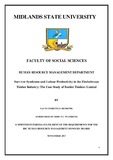Please use this identifier to cite or link to this item:
https://cris.library.msu.ac.zw//handle/11408/3969| Title: | Survivor syndrome and labour productivity in the Zimbabwean Timber Industry: the case study of Border Timbers Limited | Authors: | Sauti, Christian | Keywords: | survivor syndrome labour productivity |
Issue Date: | Nov-2017 | Abstract: | In light of massive restructurings and unceasing downsizings in Zimbabwe, the main thrust of the research was to examine the implications of survivor syndrome on labour productivity in Zimbabwean Timber Industry, using a case study of Border Timbers Limited. The study was guided by the Integrated Counterproductive Workplace Behaviour (CWB) and Organisational Citizenship Behaviour (OCB) Model by Spector and Fox (2002). Qualitative research approach was used. Quota, convenience and purposive sampling were used to draw forty-one (41) participants at BTL. Data was collected using semi-structured interviews and semi-structured questionnaires. The tables, matrixes, narratives and descriptive format were used for data presentation whilst thematic approach was used to analyse data. The research found that survivor syndrome is caused by fear for job insecurity, breach of psychological contract, and perceived witchcraft. The research revealed positive effects of survivor syndrome on labour productivity arguing that it enhances employee morale, motivation and commitment as employees are happy to secure jobs. However, survivor syndrome enhances counterproductive behaviours as employees suffer health problems and concentrate more on personal survival at the expense of the firm. The study highlighted that lack of proper strategies can heighten the effects of survivor syndrome on real output per labour unit. The study identified challenges such as poor planning and financial crisis as weakening the company’s ability to manage survivor syndrome. The researcher recommended BTL to invest in honest communication, development of a dignity policy at workplace, involvement and participation of employees to manage the effects of survivor syndrome on labour productivity. Lastly, the study concluded that survivor syndrome is a reality; it is a detrimental cancer for labour productivity. It has far reaching consequences which require management support and a sober thinking in rebuilding trust and cultivating a new culture as to aid rapid growth of organisational citizenship behaviours. | URI: | http://hdl.handle.net/11408/3969 |
| Appears in Collections: | Bsc Human Resource Management Honours Degree |
Show full item record
Page view(s)
116
checked on Jan 14, 2025
Download(s)
106
checked on Jan 14, 2025
Google ScholarTM
Check
Items in MSUIR are protected by copyright, with all rights reserved, unless otherwise indicated.



